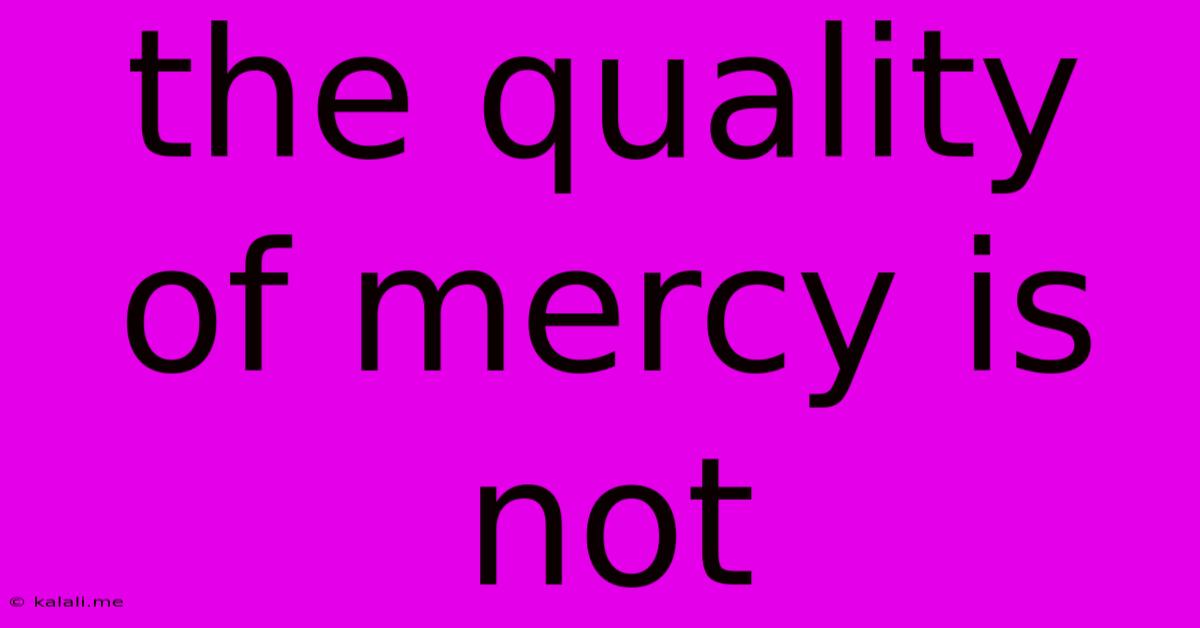The Quality Of Mercy Is Not
Kalali
May 19, 2025 · 3 min read

Table of Contents
The Quality of Mercy Is Not Strained: Exploring Shakespeare's Timeless Wisdom
Shakespeare's famous line, "The quality of mercy is not strained," from The Merchant of Venice, resonates even centuries later. It's a powerful statement about compassion, forgiveness, and the inherent human capacity for both cruelty and kindness. This article delves into the meaning and significance of this quote, exploring its context within the play and its broader application to our modern world. Understanding this quote offers valuable insights into human nature and the importance of empathy.
Understanding the Context: The line is spoken by Portia, disguised as a lawyer, during the trial of Shylock. Shylock, a Jewish moneylender, demands a pound of Antonio's flesh as payment for a defaulted loan. Portia's plea for mercy isn't just a sentimental appeal; it's a strategic argument that highlights the inherent flaws in Shylock's vengeful pursuit. She argues that mercy is a virtue that transcends the strict letter of the law, and that it's a powerful force that elevates the giver as much as the receiver. It is not something forced or begrudgingly given; it flows naturally from a generous heart.
The Meaning of "Strained": The word "strained" is crucial here. It doesn't simply mean difficult; it implies something forced, unnatural, or artificial. True mercy, according to Portia, is freely given, not extracted under duress or obligation. It's a spontaneous act of compassion, emanating from a place of understanding and empathy. This is a significant distinction, highlighting the difference between genuine forgiveness and a forced act of appeasement.
Exploring the Nuances of Mercy:
-
Mercy vs. Justice: The scene in The Merchant of Venice presents a compelling juxtaposition of mercy and justice. Shylock insists on the letter of the law, while Portia advocates for a higher moral principle. This conflict highlights the tension between legal systems and ethical considerations. Sometimes, justice demands strict adherence to rules, while mercy necessitates a departure from the rigid application of those rules.
-
The Power of Forgiveness: Portia's plea for mercy isn't just a plea for Antonio; it's also a plea for Shylock himself. By choosing mercy, Antonio and the court would not only save Antonio's life but also offer Shylock a path toward redemption and reconciliation. Forgiveness, when freely given, offers the potential for healing and transformation.
-
The Nature of Human Compassion: The quote speaks to the fundamental aspects of human nature. We are all capable of both great cruelty and immense compassion. The choice we make—to embrace mercy or to succumb to vengeance—defines who we are and the kind of world we create.
Relevance in the Modern World:
The quote's relevance extends far beyond the Elizabethan era. In a world often characterized by conflict and division, the need for mercy and compassion is perhaps more profound than ever. Consider:
-
Social Justice: The concept of mercy is crucial in addressing issues of social justice and restorative practices. Rehabilitative approaches to criminal justice often emphasize forgiveness and second chances, acknowledging the possibility of rehabilitation.
-
Interpersonal Relationships: In our personal lives, extending mercy is essential for maintaining healthy and meaningful relationships. Forgiveness and understanding are critical elements in overcoming conflicts and building stronger bonds.
-
Global Conflicts: On a larger scale, the principle of mercy plays a critical role in conflict resolution and peacebuilding. International diplomacy often relies on negotiations and compromises that require parties to show understanding and compassion towards their adversaries.
Conclusion: "The quality of mercy is not strained" is more than just a beautiful turn of phrase; it's a profound statement about the transformative power of compassion. Shakespeare's insight into human nature remains strikingly relevant today, reminding us that the choice between mercy and revenge shapes not only the lives of those we affect but also our own. Choosing mercy is not weakness but a testament to our strength of character and our commitment to creating a more just and compassionate world.
Latest Posts
Latest Posts
-
Do Stop Start Batteries Need To Be Programmed
May 19, 2025
-
What Goes Up And Down But Never Moves
May 19, 2025
-
Reduce Embedded Image And File Size In Illustrator
May 19, 2025
-
Make Google My Homepage On Iphone
May 19, 2025
-
When Was The Last Time The
May 19, 2025
Related Post
Thank you for visiting our website which covers about The Quality Of Mercy Is Not . We hope the information provided has been useful to you. Feel free to contact us if you have any questions or need further assistance. See you next time and don't miss to bookmark.